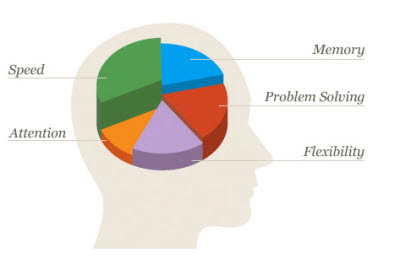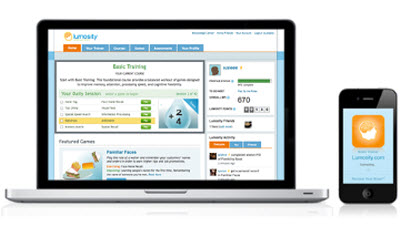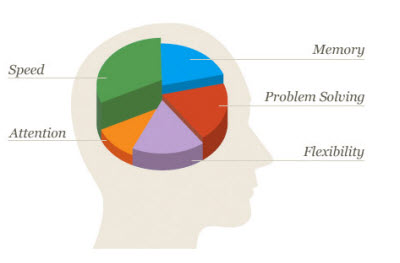 Lumosity has quietly amassed more than 14 million members for its brain-training games, which help you improve your core mental abilities. That in turn has enabled the company to raise $32.5 million in a third round of funding today.
Lumosity has quietly amassed more than 14 million members for its brain-training games, which help you improve your core mental abilities. That in turn has enabled the company to raise $32.5 million in a third round of funding today.
In the past year along, Lumosity has signed up 8 million users for its online brain exercises. The success shows that combining games with other industries such as health can lead to a strong new business with users who are both engaged and happy. The company is at the center of trends such as the “quantified self” and “gamification of health” that change the way consumers behave. It may sound like quackery, but the company insists its foundation in research is strong.
The round was led by Menlo Ventures, with participation by existing investors FirstMark Capital, Harrison Metal and Norwest Venture Partners. The company said it has paying subscribers in 180 countries and revenues have grown 25 percent quarter over quarter since its launch in 2007. The overall goal is to improve the lives of people in a meaningful way and create a great business at the same time.
“Lumosity is comparable to a gym in that it is useful for practically anybody who would like to improve their own abilities and fitness,” said Pravin Vazirani, managing director at Menlo Ventures.
 Created by neuroscientists from Stanford University, Lumosity offers personalized training programs customized to the needs of each player. Lumosity says several peer-reviewed science publications have found its games to be effective in improving core cognitive abilities such as working memory, visual attention and fluid intelligence. The site has more than 40 games now aimed at improving memory and attention. That’s key for people who show signs of aging or memory loss.
Created by neuroscientists from Stanford University, Lumosity offers personalized training programs customized to the needs of each player. Lumosity says several peer-reviewed science publications have found its games to be effective in improving core cognitive abilities such as working memory, visual attention and fluid intelligence. The site has more than 40 games now aimed at improving memory and attention. That’s key for people who show signs of aging or memory loss.
In the meantime, Lumosity has collected the largest and most comprehensive database of human cognition ever compiled, which Lumosity uses to improve its training programs. Lumosity is collaborating with 25 academic institutions, including all of the top five neuroscience programs in the U.S. Kunal Sarkar, chief executive of Lumosity, says professionals report that they are sharper and more confident in everyday life because they play the games. That motivates the company to do more, he said.
Tim Chang, a partner at Norwest Venture Partners (and a speaker at our upcoming GamesBeat 2011 conference, says the trends in gamification are leading millions of consumers to exercise their brains as regularly as they visit the gym.
Lumosity’s mobile app Brain Trainer was No. 1 in the Apple iTunes store and spent nearly two months in the top 25 downloads list. The company says its revenues are ten times the size of its nearest competitor. Rivals include Posit Science, Cognifit and Fitbrains.
Lumosity has 36 employees and was founded in 2006. It launched its web site in 2007. Total funding to date is $36 million.
 We’ll be exploring the most disruptive game technologies and business models at our third annual GamesBeat 2011 conference, on July 12-13 at the Palace Hotel in San Francisco. It will focus on the disruptive trends in the mobile games market. GamesBeat is co-located with our MobileBeat 2011 conference this year. To register, click on this link. Sponsors can message us at sponsors@venturebeat.com. To enter the Who’s Got Game? contest for the best game startup, click here.
We’ll be exploring the most disruptive game technologies and business models at our third annual GamesBeat 2011 conference, on July 12-13 at the Palace Hotel in San Francisco. It will focus on the disruptive trends in the mobile games market. GamesBeat is co-located with our MobileBeat 2011 conference this year. To register, click on this link. Sponsors can message us at sponsors@venturebeat.com. To enter the Who’s Got Game? contest for the best game startup, click here.
VentureBeat's mission is to be a digital town square for technical decision-makers to gain knowledge about transformative enterprise technology and transact. Learn More

